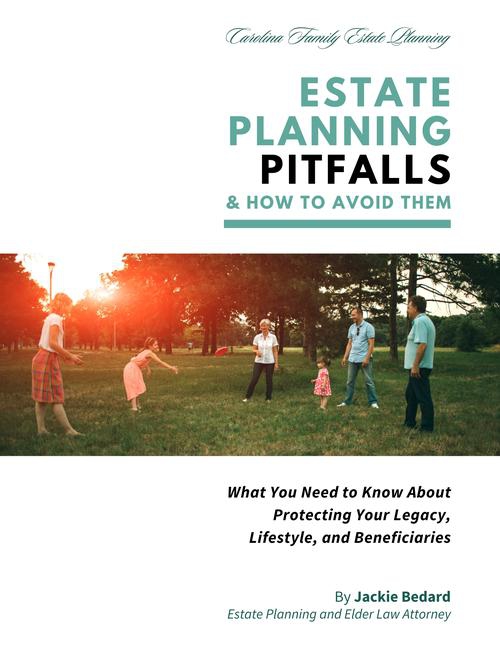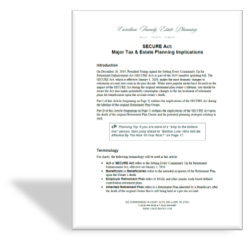For North Carolina families, a will or trust is a vital document. For a family that includes children from a previous marriage or relationship, the stakes are even higher. Blended families face unique legal and emotional challenges that the standard "leave everything to my spouse and then our children" plan does not address. Without a carefully crafted strategy, you risk your assets going to the wrong people, unintentionally disinheriting your own children, or creating a legacy of conflict instead of harmony.
This guide will discuss the key considerations and essential tools for estate planning in a blended family, with a focus on North Carolina law.
The Challenge: When Family Dynamics Don't Fit the Standard Will
When you remarry, your old estate plan becomes immediately outdated. The simple will you created during your first marriage will likely conflict with your current family structure, leading to unintended consequences, confusion, and family disputes.
The "Leave It All to My Spouse" Trap
It seems simple to just leave everything to your new spouse in your will. You trust them to take care of your children from a previous marriage. But this approach is a major risk.
Think of it like a chain of command. If your will says, "All my assets go to my spouse," that's where the chain ends. Once your spouse receives those assets, they are legally theirs. If they later pass away, their own will—or North Carolina's law if they don't have one—will decide who inherits their property.
This could mean the assets you intended for your children end up going to your spouse's children instead. Even more, if your surviving spouse remarries, their new spouse may now have legal rights to those assets, potentially cutting your children out entirely. The trust you had in your spouse does not create a legal obligation to pass your assets on to your children.
Understanding NC Intestacy Law
If you die without a will in North Carolina, the state's intestacy laws will dictate how your property is distributed. This can be particularly problematic for blended families. For example, under N.C. Gen. Stat. § 29-14, if you have a spouse and children who are not also the children of your spouse, your surviving spouse would receive a portion of your estate, and your children would receive the rest. This distribution may not align with your wishes or needs, especially if you want to provide a specific inheritance for your children while also caring for your surviving spouse.
The Importance of Beneficiary Designations
Many of your most valuable assets, such as retirement accounts and life insurance policies, pass to beneficiaries you name on the account documents. These designations supersede anything written in your will. A common mistake is forgetting to update these beneficiaries after remarriage, which can result in a former spouse receiving a windfall intended for your new family.
Foundational Tools for a Peace-Proof Plan
Creating a robust estate plan for a blended family requires a combination of legal documents working in concert to achieve your goals.
The Role of an Updated Will
Your will remains a critical document. It names an executor to manage your estate, appoints guardians for minor children, and directs the distribution of assets not governed by a trust or beneficiary designation. For blended families, it is essential that your will clearly articulates your wishes and is consistent with all other planning documents.
Why a Revocable Living Trust is a Cornerstone
A revocable living trust is often the best solution for blended families. It allows you to create a framework that balances the needs of your new spouse and your children. A trust can:
- Provide for Your Spouse: The trust can stipulate that your surviving spouse receives income or access to certain assets for their lifetime. This ensures they are financially secure.
- Protect Your Children's Inheritance: Upon your surviving spouse's death, the trust assets can be distributed to your children, as you originally intended. This prevents the "leave it to my spouse" trap.
- Avoid Probate: Assets held in a trust avoid the costly and public probate process, which can reduce the opportunity for family conflict.
- Control Distribution: You can specify exactly how and when assets are distributed to your children, such as at certain ages or for specific purposes.
Specialized Trusts for Blended Families
Certain trusts are specifically designed to address blended family concerns. A Qualified Terminable Interest Property (Q-TIP) trust, often referred to as a “Marital Trust,” is a common example. It allows you to provide for your spouse for their lifetime while ensuring that the trust's principal passes to your children upon the spouse's death. This structure offers a way to honor both relationships without sacrificing one for the other.
The Power of a Postnuptial Agreement
For couples who are already married, a postnuptial agreement can clarify what happens to assets in the event of a divorce or death. While it cannot fully replace a comprehensive estate plan, it can be a valuable tool to define separate property and waive certain rights, such as a spouse's elective share under North Carolina law, which ensures your own assets pass to your children as you intended.
Common Mistakes to Avoid
Even with the right documents in place, a few simple oversights can unravel your best-laid plans.
Forgetting to Update Beneficiaries
This is one of the most frequent and costly errors. Always ensure the beneficiary forms on your retirement accounts, life insurance policies, and annuities are up to date and consistent with your overall plan. This single step can prevent your assets from bypassing your will or trust and going directly to an unintended heir.
Overlooking Incapacity Planning
Estate planning is not just about what happens after you die. It's also about what happens if you become unable to manage your own affairs. A comprehensive plan should include a durable power of attorney and a health care power of attorney. These documents appoint agents to make financial and medical decisions for you. Choosing the right person to fill these roles is critical in a blended family, as it can prevent disagreements among family members.
The Pitfalls of Joint Ownership
Many couples own property jointly with a "right of survivorship." While convenient, this arrangement can inadvertently disinherit your children. For example, if you add your new spouse's name to a bank account you held before the marriage, that account will pass entirely to your spouse upon your death, even if your will says otherwise.
Lack of Communication
One of the most effective ways to prevent family disputes is to have an open, honest conversation about your estate plan. While it may be uncomfortable, explaining your wishes to your spouse and adult children can help manage expectations and reduce the potential for a battle over your assets later on. A neutral third party, like your estate planning attorney, can help facilitate these conversations.
What to Do Next: Your Path to a Secure Plan
Blended family estate planning requires a thoughtful and personalized approach. It's not a one-size-fits-all process. The legal landscape in North Carolina is complex, and an outdated or incomplete plan can create more problems than it solves.
The most important step you can take is to seek legal guidance from an attorney who specializes in estate planning for blended families. At Carolina Family Estate Planning, we can help you navigate the nuances, draft the right documents, and create a plan that brings you peace of mind.
Don't wait for a crisis to secure your family's future. Schedule a case assessment with our team today.
Frequently Asked Questions
Q: Can a blended family estate plan prevent my spouse from disinheriting my children?
A: Yes, with the proper legal tools. A well-drafted revocable living trust or a Q-TIP trust can ensure that your surviving spouse is provided for during their lifetime, while guaranteeing that the remaining assets pass to your children after they are gone.
Q: What is the elective share in North Carolina, and how does it affect blended families?
A: Under North Carolina law, a surviving spouse has a right to claim a portion of the deceased spouse's estate, known as the "elective share," even if they were disinherited in a will. The amount of the share depends on the length of the marriage. A postnuptial agreement, drafted correctly, can waive this right.
Q: How do I handle beneficiary designations for my life insurance and retirement accounts?
A: You should review and update these designations to align with your overall estate plan. Many blended families name a trust as the primary beneficiary, which allows the trust's terms to dictate how the funds are used for the benefit of both the surviving spouse and children.








